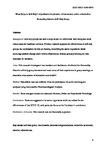What helps in self-help? A qualitative exploration of interactions within a borderline personality disorder self-help group
| dc.contributor.author | Bond, B | |
| dc.contributor.author | Wright, J | |
| dc.contributor.author | Bacon, Alison | |
| dc.date.accessioned | 2017-09-15T16:14:57Z | |
| dc.date.available | 2017-09-15T16:14:57Z | |
| dc.date.issued | 2017-08-31 | |
| dc.identifier.issn | 0963-8237 | |
| dc.identifier.issn | 1360-0567 | |
| dc.identifier.uri | http://hdl.handle.net/10026.1/9937 | |
| dc.description | peerreview_statement: The publishing and review policy for this title is described in its Aims & Scope. aims_and_scope_url: http://www.tandfonline.com/action/journalInformation?show=aimsScope&journalCode=ijmh20 | |
| dc.description.abstract |
Background: Self-help groups can have a large impact on individuals well-being and could reduce costs for healthcare services. Previous research supports the effectiveness of self-help groups, but explanations for this are lacking. Identifying the active ingredients which encourage positive change could inform effectiveness of these groups producing the best outcomes for members.Aim: This research investigated how members and facilitators of a borderline personality disorder self-help group (BPD SHG)interacted and made sense of their experiences in group meetings, to determine what aspects of interaction were helpful.Method: Naturalistic data was collected from 10 participants via audio recording and analysed using interpretative phenomenological analysis.Results: Three emergent themes are discussed: humour, praise and experiential knowledge.Conclusion: These are suggested to be active ingredients which are critical for the effectiveness of this BPD SHG, with particular focus on the facilitator's contribution. | |
| dc.format.extent | 1-7 | |
| dc.format.medium | Print-Electronic | |
| dc.language | en | |
| dc.language.iso | en | |
| dc.publisher | Informa UK Limited | |
| dc.subject | Self-help group | |
| dc.subject | interpretative phenomenological analysis | |
| dc.subject | borderline personality disorder | |
| dc.subject | effectiveness | |
| dc.title | What helps in self-help? A qualitative exploration of interactions within a borderline personality disorder self-help group | |
| dc.type | journal-article | |
| dc.type | Journal Article | |
| plymouth.author-url | https://www.webofscience.com/api/gateway?GWVersion=2&SrcApp=PARTNER_APP&SrcAuth=LinksAMR&KeyUT=WOS:000499934600010&DestLinkType=FullRecord&DestApp=ALL_WOS&UsrCustomerID=11bb513d99f797142bcfeffcc58ea008 | |
| plymouth.issue | 6 | |
| plymouth.volume | 28 | |
| plymouth.publication-status | Published | |
| plymouth.journal | Journal of Mental Health | |
| dc.identifier.doi | 10.1080/09638237.2017.1370634 | |
| plymouth.organisational-group | /Plymouth | |
| plymouth.organisational-group | /Plymouth/Faculty of Health | |
| plymouth.organisational-group | /Plymouth/Faculty of Health/School of Psychology | |
| plymouth.organisational-group | /Plymouth/REF 2021 Researchers by UoA | |
| plymouth.organisational-group | /Plymouth/REF 2021 Researchers by UoA/UoA04 Psychology, Psychiatry and Neuroscience | |
| plymouth.organisational-group | /Plymouth/REF 2021 Researchers by UoA/UoA04 Psychology, Psychiatry and Neuroscience/UoA04 REF peer reviewers | |
| plymouth.organisational-group | /Plymouth/Research Groups | |
| plymouth.organisational-group | /Plymouth/Research Groups/Centre for Brain, Cognition and Behaviour (CBCB) | |
| plymouth.organisational-group | /Plymouth/Research Groups/Centre for Brain, Cognition and Behaviour (CBCB)/Behaviour | |
| plymouth.organisational-group | /Plymouth/Research Groups/Plymouth Institute of Health and Care Research (PIHR) | |
| plymouth.organisational-group | /Plymouth/Users by role | |
| plymouth.organisational-group | /Plymouth/Users by role/Academics | |
| dc.publisher.place | England | |
| dcterms.dateAccepted | 2017-07-24 | |
| dc.rights.embargodate | 2018-8-31 | |
| dc.identifier.eissn | 1360-0567 | |
| dc.rights.embargoperiod | Not known | |
| rioxxterms.versionofrecord | 10.1080/09638237.2017.1370634 | |
| rioxxterms.licenseref.uri | http://www.rioxx.net/licenses/all-rights-reserved | |
| rioxxterms.licenseref.startdate | 2017-08-31 | |
| rioxxterms.type | Journal Article/Review |


